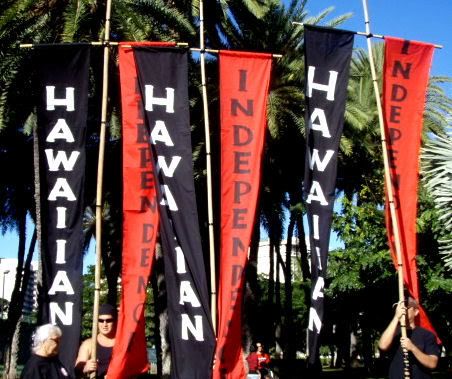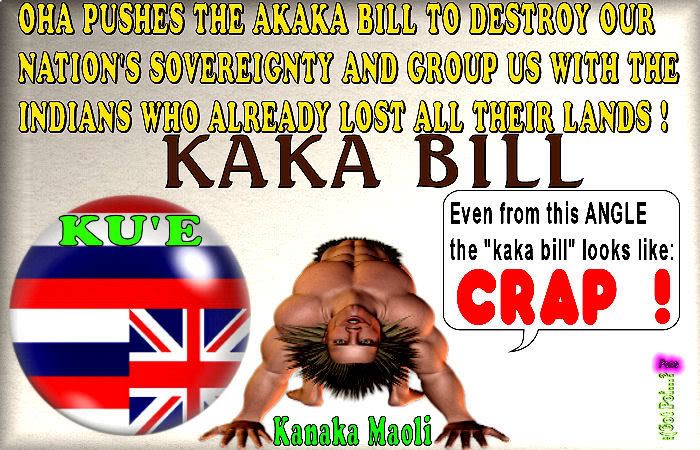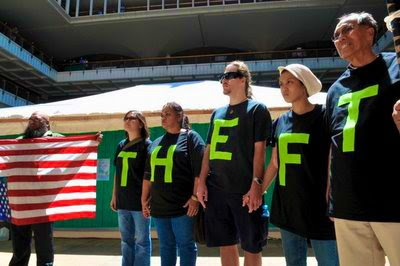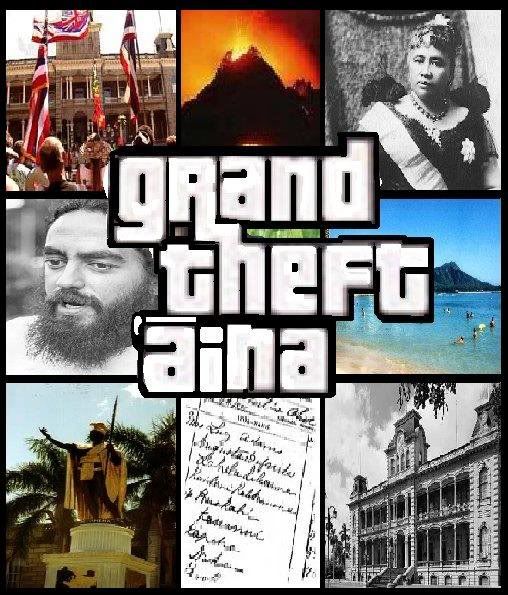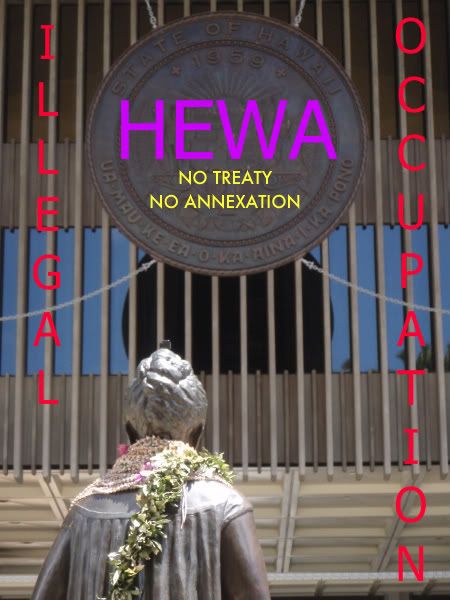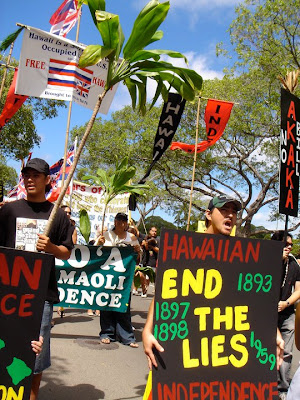Sharing. A perspective.
HOUSE OF REPRESENTATIVES
THE TWENTY-SIXTH LEGISLATURE
REGULAR SESSION OF 2011
Rep. Faye P. Hanohano, Chair | ||
Rep. Chris Lee, Vice Chair | ||
Rep. Jessica Wooley, Chair | ||
Rep. Della Au Belatti, Vice Chair | ||
DATE: |
|
|
TIME: | 8:30 a.m. |
|
PLACE: | Conference Room 329 State Capitol 415 South Beretania Street |
|
Madame Chair, distinguished committee members, ladies and gentlemen:
My name is Keoni Kealoha Agard, a Native Hawaiian attorney. We testify today on behalf of the members of Hui Aloha Aina so that their voices are no longer silenced. We testify in opposition to SB 1520.
NEITHER STATE OF HAWAII LEGISLATURE NOR THE U.S. CONGRESS HAS THE
RIGHT TO USURP, INTERVENE OR ENCROACH UPON THE AUTHORITY OF THE EXECUTIVE BRANCH OR THE U.S.PRESIDENT
The sovereign status of the Kingdom of Hawaii is protected and
preserved by two EXECUTIVE AGREEMENTS in 1893 made by President Grover Cleveland and Queen Liliuokalani, two soverign heads of two distinct and separate nations.
Because of the existence of the EXECUTIVE AGREEMENTS between President Grover Cleveland and Queen Liliuokalani,.this legislative body cannot consider legislation to reorganize a Native Hawaiian government in connection with SB 1520.
THE 1893 EXECUTIVE AGREEMENTS WERE NEVER TERMINATED OR EXTINIGUISHED AND REMAIN IN LEGAL FORCE AND EFFECT
These Executive Agreements remain intact under the authority of the executive branch of the United States Government. The responsibility to administer these Executive Agreements now are held in the hands of President Barack Obama.
EXECUTIVE AGREEMENTS WERE ENTERED INTO BY TWO SOVEREIGN HEADS OF STATE: THE UNITED STATES AND THE KINGDOM OF HAWAII BOTH RECOGNIZED BY U.S. LAW AS WELL AS INTERNATIONAL LAW
A pact or understanding with a foreign government reached by the
President or a Presidential agent is called an executive agreement.
The agreement may be written or oral. Unlike a treaty, it does not
require the advice and consent of the Senate.
The Executive Agreements in question were negotiated in 1893 between President Grover Cleveland, as sovereign head on behalf of the United States, and Queen Liliuokalani, as sovereign head on behalf of the Kingdom of Hawaii.
The President entered into these Executive Agreements under his sole constitutional authority to represent the United States in foreign relations and the Congress cannot intervene without violating the separation of powers doctrine. Intervention constitutes an encroachment upon the executive branch.
THE LI’LIUOKALANI ASSIGNMENT, the first agreement, assigned executive power to the United States President to administer Hawaiian Kingdom law and to investigate the overthrow of the Hawaiian government.
THE RESORATION AGREEMENT , the second agreement, obligated the President of the United States to restore the Hawaiian government as it was prior to the landing of U.S. troops on January 16, 1893, and for the Queen, after the government was restored and the executive power returned to grant full amnesty to those members and supporters of the provisional government who committed treason.
QUEEN LILIUOKALANI YIELDED HER EXECUTIVE POWER OF THE KINGDOM OF HAWAII CONDITIONAL TO PRESIDENT CLEVELAND OF THE UNITED STATES UNTIL SUCH TIME THAT THE KINGDOM OF HAWAII WAS RESTORED,
THE KINGDOM OF HAWAII STILL REMAINS AND IS PROTECTED UNDER THE PRESIDENTIAL BRANCH OF THE UNITED STATES OF AMERICA
Because the executive power was yielded by Queen Liliuokalani to President Cleveland, the sovereign status of the Kingdom of Hawaii still remains in the hands of Cleveland and his successors in office under the executive branch of the U.S. government.
All other actions by the U.S. Congress, the legislative branch of the U.S. government, are invalid or ineffective as Congress has no jurisdiction to legislate where it concerns foreign countries. Moreover, the U.S. Supreme Court has ruled that Congress cannot legislate beyond the territorial borders of the United States.
Five years after the 1893 Executive Agreements were enacted, the purported successor governments of Hawaii (the Provisional Government and the Republic of Hawaii), had no authority to cede any Hawaiian lands to the United States. Under Hawaiian Kingdom Law they were insurgents and traitors who were never pardoned by Queen Liliuokalani because the United States never restored the Kingdom.
These traitors never had the right to cede any land to the United States
The executive power of the Kingdom of Hawaii and the administration of Kingdom laws were in the hands of President of the United States when the Newlands Resolution was passed.
The President granted no authority in connection with Kingdom lands to the Republic of Hawaii.
Therefore, the Republic of Hawaii had no lands to cede to the United States of America.
The attempt by the Republic of Hawaii and the United States Congress to cede all lands of the Kingdom of Hawaii is simply invalid. That attempt was a perpetration of a massive fraud upon all peoples of Hawaii over the course of the past 118 years.
EXECUTIVE AGREEMENTS ARE CONSIDERED TREATIES THUS ARE THE SUPREME LAW OF THE LAND
The Supremacy clause is found in the United States Constitution in Article IV, clause 2 which states in relevant part as follows:
This Constitution, and the Laws of the United States which shall be made in pursuance thereof; and all treaties made, or which shall be made, under the authority of the United States, shall be the supreme law of the land…(emphasis added)
In U.S. v. Belmont, the U.S. Supreme Court held that;
although an executive agreement might not be a treaty requiring ratification by the Senate, it was a compact negotiated and proclaimed under the authority of the President, and as such was a “treaty”.
Accordingly, the Executive Agreements between Liliuokalani and Cleveland are considered a treaty between two foreign nations.
EXCLUSIVE POWERS OF THE PRESIDENT ASSIGNED UNDER THE UNITED STATES CONSTITUTION
Executive agreements enable the U.S. President to make international arrangements without senatorial participation, as is constitutionally required for treaties. Presidents may thus circumvent the Constitution by calling treaties executive agreements. Executive agreements are practical alternatives made under presidential authority. Starting early with postal relations, executive agreements cover many complex subjects such as copyrights, foreign aid, and trade. Big disputes mostly concern agreements made by presidents acting independently as national negotiator and commander in chief. After a modest debut with President James Monroe's agreement to limit arms on the Great Lakes in 1817, a convenient device for temporary or detailed arrangements developed into an instrument for major foreign policies. Further, President Franklin D. Roosevelt converted executive agreements into primary instruments of foreign relations. He approved the Litvinov Agreement recognizing the Soviet Union in 1933, and the destroyer bases deal of 1940. During World War II, President Roosevelt and President Truman made secret agreements with allies at Cairo, Yalta, and Potsdam affecting most of the world. Postwar alliances and a global economy spawned thousands of executive agreements, more than 2,800 in the Reagan administration alone. As such, the U.S.President has exclusive and sole authority as it relates to conducting foreign affairs on behalf of the United States of America. Given this authority, the U.S. President is duly authorized to negotiate executive agreements with other foreign nations.
IN 1843, UNITED STATES AND THE KINGDOM OF HAWAII ENTERED INTO
TREATY RELATIONS TO OFFICIALLY RECOGNIZE THE INDEPENDENT SOVEREIGN STATUS OF THE KINGDOM OF HAWAII AS WITNESSED BY
THE ENTIRE INTERNATIONAL COMMUNITY
In the 19th century, Great Britain and France entered into a joint proclamation acknowledging and recognizing the Kingdom of Hawai`i as an independent and sovereign State on November 28th 1843. Moreover,on July 6th 1844, United States Secretary of State John C. Calhoun notified the Hawaiian government of the United States formal recognition of the Hawaiian Kingdom as an independent and sovereign state as of December 19th 1842 by President John Tyler. As a result of the United States’ recognition, the Hawaiian Kingdom entered into a Treaty of Friendship, Commerce and Navigation, Dec. 20th 1849 at 9 U.S.Stat. 977; Treaty of Commercial Reciprocity, Jan. 13th 1875 at 19 U.S. Stat. 625; Postal Convention Concerning Money Orders, Sep. 11th 1883 at 23 U.S. Stat. 736; and a Supplementary Convention to the 1875 Treaty of Commercial Reciprocity, Dec. 6th 1884 at 25 U.S. Stat. 1399. The Hawaiian Kingdom also entered into treaties with Austria-Hungary, June 18th 1875; Belgium, Oct. 4th 1862; Bremen, March 27th 1854; Denmark, Oct. 19th 1846; France, July 17th 1839, March 26th 1846, Sep. 8th 1858; French Tahiti, Nov. 24th 1853; Germany, March 25th 1879; Great Britain, Nov. 13th 1836 and March 26th 1846; Great Britain’s New South Wales, March 10th 1874; Hamburg, Jan. 8th 1848); Italy, July 22nd 1863; Japan, Aug. 19th 1871, Jan. 28th 1886; Netherlands, Oct. 16th 1862; Portugal, May 5th 1882; Russia, June 19th 1869; Samoa, March 20th 1887; Spain, Oct. 9th 1863; Sweden-Norway, April 5th 1855; and Switzerland, July 20th 1864.
In the 21st century, an international tribunal as well as the Ninth Circuit Court of Appeals acknowledged the Hawaiian Kingdom’s status as an internationally recognized state in the 19th century. In Larsen v. Hawaiian Kingdom, 119 ILR 566, 581 (2001), the Permanent Court of Arbitration in The Hague stated,
in the nineteenth century the Hawaiian Kingdom
existed as an independent State recognized as such by
the United States of America, the United Kingdom,
and various other States.
In addition, the 9th Circuit Court, in Kahawaiola`a v. Norton, 386 F.3rd 1271
(2004), also acknowledged the Hawaiian Kingdom’s status as “a co-equal sovereign alongside the United States.” Furthermore, in Doe v. Kamehameha, 416 F.3d 1025, 1048 (2005), the Court stated that, “in 1866, the Hawaiian Islands were still a sovereign kingdom.” Clearly, the Kingdom of Hawaii continues to exist.
PRESIDENT GROVER CLEVELAND’S MESSAGE TO CONGRESS IN 1893 CALLED
FOR THE RESTORATION OF KINGDOM OF HAWAII GOVERNMENT
After a thorough investigation into the facts surrounding the unlawful overthrow of the Kingdom of Hawaii government by U.S. military forces in January 1893, President Grover Cleveland made an important speech to Congress, which states in pertinent part as follows:
Thus it appears that Hawaii was taken possession of by the United States forces without the consent or wish of the government of the islands, or of anybody else so far as shown, except the United States Minister…Therefore the military occupation of Honolulu by the United States on the day mentioned was wholly without justification… (emphasis added)… I believe that a candid and thorough examination of the facts will force the conviction that the provisional government owes its existence to an armed invasion by the United States. Fair-minded people with the evidence before them will hardly claim that the Hawaiian Government was overthrown by the people of the islands or that the provisional government had ever existed with their consent. I do not understand that any member of this government claims that the people would uphold it by their suffrages if they were allowed to vote on the question…
In short, President Grover Cleveland’s message was a re- affirmation of his understanding of the executive communications he had with Queen Liliuokalani and further buttressed his intent to restore the Kingdom of Hawaii government. Further, his words to Congress were indeed consistent with his diplomat negotiations with Queen Liliuokalani pursuant to their Executive Agreements.
CONGRESSIONAL APPROVAL IS NOT REQUIRED FOR THE CLEVELAND/ LILIUOKALANI EXECUTIVE AGREEMENTS TO BE EFFECTIVE
Applicable federal caselaw establishes that Congressional approval is not required in order for an Executive Agreement to be effective. Executive Agreements entered into by the President under his constitutional authority with foreign States are treaties that do not need ratification by the Senate. See United States v. Belmont. The U.S. Constitution provides that treaties, like acts of Congress, are considered the “supreme law” of the land; see U.S. Constitution Article VI, Clause (2).
In Belmont, supra, the U.S. Supreme Court affirmed that executive agreements entered into between the President and a sovereign nation does not require ratification from the U.S. Senate to have the force and effect of a treaty; and executive agreements bind successor Presidents for their faithful execution (emphasis added). Other landmark cases on executive agreements are United States v. Pink, and American Insurance Association v. Garamendi. In Garamendi, supra, the Court stated, “Specifically, the President has authority to make ‘executive agreements’ with other countries, requiring no ratification by the Senate or approval by Congress.” According to Justice Douglas, Pink, supra, executive agreements “must be read not as self-contained technical documents, like a marine insurance contract or a bill of lading, but as characteristically delicate and elusive expressions of diplomacy.”
In short, Executive Agreements are considered a treaty, which is treated as the supreme law of the land, not requiring ratification by Congress. Likewise, Congress cannot encroach upon the Executive powers of the President as it relates to Executive Agreements, including such Agreement between President Cleveland with Queen Liliuokalani in 1893.
NO CONGRESSIONAL ACT CAN SUPERCEDE THE EXECUTIVE AGREEMENTS
Based on the court decisions in Rose, supra, and The Apollon, supra, cited above, the United States cannot legislate by passing laws that impact the citizens of other foreign states. There is no precedent or authority for taking such action. For example, the U.S. is precluded from passing laws via Congress on behalf of citizens from Great Britain, France, Germany and others. Likewise, it is precluded from passing laws via Congress on behalf of citizens of the Kingdom of Hawaii.
Queen Liliuokalani turned over her executive power to the President for him to faithfully administer Hawaiian Kingdom law. To this day, the President still holds that executive power, consistent with the Liliuokalani assignment. As such, Congress cannot encroach upon the exclusive executive power of the President.
“SEPARATION OF POWERS DOCTRINE”- PRECLUDES ENCROACHMENT BY THE THREE BRANCHES OF GOVERNMENT WITH EACH OTHER
Separation of powers is a political doctrine originating from the United States Constitution, whereby the legislative, executive, and judical branches of the United States government are kept distinct in order to prevent abuse of power. This U.S. form of separation of powers is associated with a system of checks and balances. Each branch of government is given exclusive powers and assigned certain responsibilities under the U.S. Constitution. The separation of powers doctrine precludes encroachment by any one branch into the responsibilities assigned to other branches of government.
ANY ACTS BY SUCCESSOR GOVERNMENTS, BY CONGRESS OR BY OTHERS AFTER LILIUOKALANI ASSIGNMENT ARE INVALID
Any acts taken by successor governments, the Congress and/or others are ineffective and invalid. The executive power remains in the hands of President Cleveland and his successors in office. Hawaiian lands and Kingdom of Hawaii government was never legitimately transferred because they were under the protection of the office of the President pursuant to the Executive Agreement between President Cleveland and Queen Liliuokalani. Such executive power was held by Cleveland and his successors until such time that the Kingdom of Hawaii government is restored.
THE UNITED STATES IS PRECLUDED FROM LEGISLATING BEYOND ITS OWN TERRITORIAL BORDERS
According to Born, “American courts, commentators, and other authorities understood international law as imposing strict territorial limits on national assertions of legislative jurisdiction.” Furthermore, in Rose v. Himely, the U.S. Supreme Court illustrated this view by asserting, “that the legislation of every country is territorial;” and in The Apollon, the Court stated that the “laws of no nation can justly extend beyond its own territory” for it would be “at variance with the independence and sovereignty of foreign nations.” The Court also explained, “however general and comprehensive the phrases used in our municipal laws may be, they must always be restricted in construction, to places and persons, upon whom the legislature have authority and jurisdiction.”
NO TREATY OF ANNEXATION WAS EVER PASSED BY U.S. CONGRESS TO EXTINGUISH THE EXISTENCE OF THE KINGDOM OF HAWAII
There were two attempts to introduce a treaty of annexation before the U.S. Congress first in 1893, then again in 1897. Both failed in Congress (see Exhibit 1-2), attached hereto. The history books must be corrected to reflect the real facts. There never was any annexation of the Kingdom of Hawaii. As such, the Kingdom of Hawaii continues to exist (see Hague decision in Larsen v. Kingdom of Hawaii, supra), notwithstanding the unlawful military occupation of the Kingdom of Hawaii by the U.S.
JOINT RESOLUTION BY U.S.CONGRESS IN 1898 IS INEFFECTIVE AS KINGDOM
WAS UNDER THE PROTECTION OF THE PRESIDENT THUS KINGDOM OF
HAWAII CONTINUES TO EXIST
President Cleveland had already entered in an agreement to restore the Kingdom of Hawaii government prior to Congressional efforts to take Hawaii. Because Cleveland retained the executive power of Liliuokalani, the successor government, Republic of Hawaii, had no legal standing to attempt to cede any Hawaiian lands to the U.S. by way of a joint resolution. Further, Cleveland never authorized ceding of lands to either the Provisional government or the Republic of Hawaii. Neither successor government could have ceded Hawaii lands because they had nothing to cede. Two attempts to secure a treaty of annexation failed in Congress. Although a Joint Resolution to annex Kingdom of Hawaii to the United States was passed in Congress, such measure has no legal force and effect. First, the Kingdom of Hawaii was under the protection of President Cleveland pursuant to the Executive Agreements. Second, there is no constitutional authority under the U.S. Constitution that authorizes Congress to annex a territory by way of joint resolution, as opposed to a treaty of annexation (that failed twice in Congress). Third, the Provisional government and Republic of Hawaii under Kingdom law were traitors under Hawaiian Kingdom law, and had no legitimate claim to Lands of the Kingdom of Hawaii.
In 1898, the U.S. Congress, in an act of desperation, in violation of the U.S. Constitution and further in violation of and also contrary to international law, passed a joint resolution. Said resolution purportedly claimed annexation of the Kingdom of Hawaii; it falsely claimed then and still continues to claim, without merit, the extinction of the Kingdom of Hawaii.
However, the facts reveal that the Congress failed at two different points in time in 1893 and 1897, thus was never able to pass a law, nor to approve any treaty of annexation of the Kingdom of Hawaii, contrary to many fictitious commentaries throughout history who claim that Kingdom of Hawaii was annexed. Nothing can be farther from the truth. A careful examination will reveal that there is no provision whatsoever in the U.S. Constitution that allows for annexation of any foreign country, including the Kingdom of Hawaii, by the United States by use of a joint resolution resolution. Any attempt to declare otherwise has no merit. In short, the passage of the joint resolution was simply a political ploy to dupe others into falsely believing the Kingdom of Hawaii was annexed to the U.S., when it was not.
ALL EVENTS OCCURING AFTER LILIUOKALANI ASSIGNMENT ARE INEFFECTIVE AND HAS NO LEGAL FORCE AND EFFECT
The separation of powers doctrine does not allow any U.S. branch of government to encroach upon the duties and responsibility assigned to the other branches.
When Liliuokalani yielded her executive power to the U.S. President, he was charged to faithfully carry out the terms of the Executive Agreements on her behalf. That same power still rests with the President today. Other branches of government cannot encroach. It is important to emphasize that all of the events described earlier, had no effect whatsoever on the executive power entrusted to the President. Any events occurring after the Liliuokalani assignment to President Cleveland had no legal force and effect whatsoever. Any actions by alleged successor governments of the Kingdom of Hawaii, or by Congress, or by anyone else, is a direct encroachment on the powers of the President.
NO STATE LAW CAN SUPERCEDE EXECUTIVE AGREEMENTS
The State of Hawai`i’s may allege a claim to territorial jurisdiction under HRS 701-106(1)(a). However, it is in direct conflict with the 1893 Executive Agreements and the judicial precedence set in three U.S. Supreme Court decisions pursuant to Belmont, supra (1937), Pink, supra, (1942), and Garamendi, supra (2003), which is in violation of the Supremacy clause.
Since the United States is a Federal government, States within the Federal Union are subject to the supremacy of Federal laws and treaties, in particular, executive agreements. U.S. constitution, article VI, clause 2, provides:
This Constitution, and the Laws of the United States which shall be made in pursuance thereof; and all treaties made,or which shall be made, under the authority of the United States, shall be the supreme law of the land; and the judges in every state shall be bound thereby, anything in the constitution or laws of any state to the contrary notwithstanding (emphasis added).
In Belmont, supra and Pink,supra, the Court gave effect to the express terms of an executive agreement that extinguishes all underlying claims of relief sought under State law. The Lili`uokalani assignment mandates the President to administer Hawaiian Kingdom law until the Hawaiian Kingdom government can be restored as mandated by the Agreement of restoration. Instead, the State of Hawai`i was established by an Act of Congress in 1959, which is an encroachment on the executive power of the President, and the recognized principle of the “exclusive power of the President as the sole organ of the federal government in the field of international relations,” (emphasis added).
In Belmont, supra, the U.S. Supreme Court stated that:
no state policy can be found to legally supersede an executive agreement between the federal government and a foreign country. The external powers of the U.S. government can be exercised without regard to State laws.
The Lili`uokalani Assignment and the Agreement of Restoration are Federal matters under the exclusive authority of the President by virtue of Article II of the U.S. Constitution. The Lili`uokalani Assignment and the Agreement of Restoration divests this legislative body from exercising subject matter jurisdiction over such matters.
MILITARY OCCUPATION BY THE UNITED STATES DOES NOT EXTINGUISH THE SOVEREIGN STATE OF THE KINDGOM OF HAWAII
Let us address the question on whether or not the Hawaiian Kingdom status as a sovereign state was extinguished after its government was overthrown by U.S. troops on January 17th 1893. As a subject of international law, statehood of the Hawaiian Kingdom can only be measured and determined by the rules of international law and not the domestic laws of any State to include the United States and the Hawaiian Kingdom.
According to Professor Crawford, a well recognized international law scholar, “A State is not necessarily extinguished by substantial changes in territory, population or government, or even, in some cases, by a combination of all three.” In particular, military “occupation does not extinguish the State pending a final settlement of the conflict. And, generally, the presumption—in practice a strong presumption—favors the continuity and disfavors the extinction of an established State.” Professor Wright, a renowned scholar in U.S. foreign relations law, states that, “international law distinguishes between a government and the state it governs.” Wright says that:
A state may continue to be regarded as such even though, due to insurrection or other difficulties, its internal affairs become anarchic for an extended period of time;” and “Military occupation, whether during war or after an armistice, does not terminate statehood (emphasis added)
Therefore, a sovereign State would continue to exist despite its government being overthrown by military force. Two contemporary examples illustrate this principle of international law, including the overthrow of the Taliban (Afghanistan) in 2001 and of Saddam Hussein (Iraq) in 2003. The former has been a recognized sovereign State since 1919, while the latter since 1932. Further, Professor Dixon explains:
If an entity ceases to possess any of the qualities of statehood…this does not mean that it ceases to be a state under international law. For example, the absence of an effective government in Afghanistan and Iraq following the intervention of the USA did not mean that there were no such states, and the same is true of Sudan where there still appears to be no entity governing the country effectively. Likewise, if a state is allegedly ‘extinguished’ through the illegal action of another state, it will remain a state in international law.
According to Professor Marek, “the legal order of the occupant is…strictly subject to the principle of effectiveness, while the legal order of the occupied State continues to exist notwithstanding the absence of effectiveness [e.g. no government]. …[Occupation] is thus the classical case in which the requirement of effectiveness as a condition of validity of a legal order is abandoned.” Referring to the United States’ occupation of the Hawaiian Kingdom in his law journal article, Professor Dumberry states:
the 1907 Hague Convention protects the international personality of the occupied State, even in the absence of effectiveness. Furthermore, the legal order of the occupied State remains intact, although its effectiveness is greatly diminished by the fact of occupation. As such, Article 43 of the 1907 Hague Convention IV provides for the co-existence of two distinct legal orders, that of the occupier and the occupied.
In the case of Kingdom of Hawaii, it remained protected under the power of the Executive Branch pursuant to the terms of the Executive Agreements. Said Agreements remain under the protection of the current President to this very day. Therefore, although the occupation continues to the present day, the Kingdom of Hawaii continues to exist as a sovereign state. The Lili`uokalani Assignment and the Agreement of Rrestoration are Federal matters under the exclusive authority of the President by virtue of Article II of the U.S. Constitution. Accordingly, this legislative body cannot exercise subject matter jurisdiction without violating the Supremacy Clause and the separation of powers doctrine under the U.S.Constitution.
CONCLUSION
The Lili`uokalani Assignment and the Agreement of Restoration, being Executive Agreements, were entered into under the sole authority of the President in foreign relations. The proper authority rests in the Executive Branch. Only the President reserves the proper authority to resolve this controversy. This legislative body does not have such authority. The legislative body cannot usurp or intervene when the Executive Agreements are reserved to the President. Under the separation of powers doctrine, the question of which branch reserves the power to conduct foreign affairs, it is clearly the President.
In short, we strongly urge this legislative body to drop this bill and allow the proper branch of government to address these matters described above. Thank you for this opportunity to share our concerns on SB 1520.
Acknowledgement to Louis Buzzy Agard, John M. Agard, Keanu Sai, Dexter Kaiama, Kale Gumapac, Sol Naluai, Lehua Kinilau-Cano, Tracy Tamanaha, Mary Ann Saindon, Lynette & Franklin Valdez and many others


